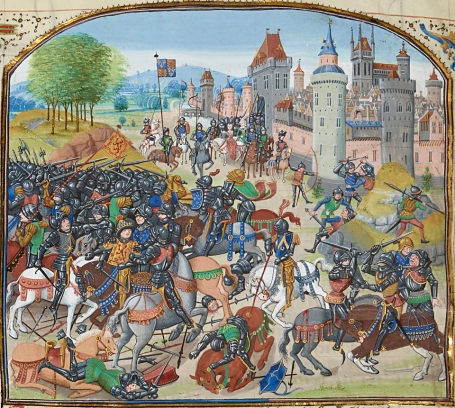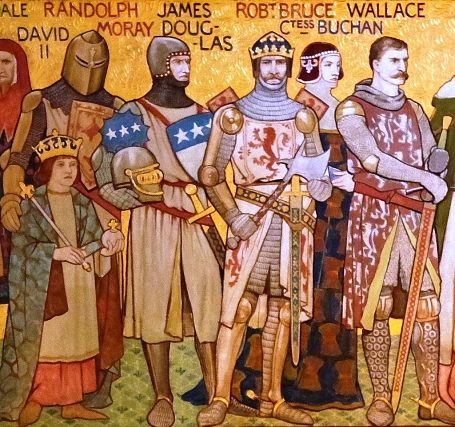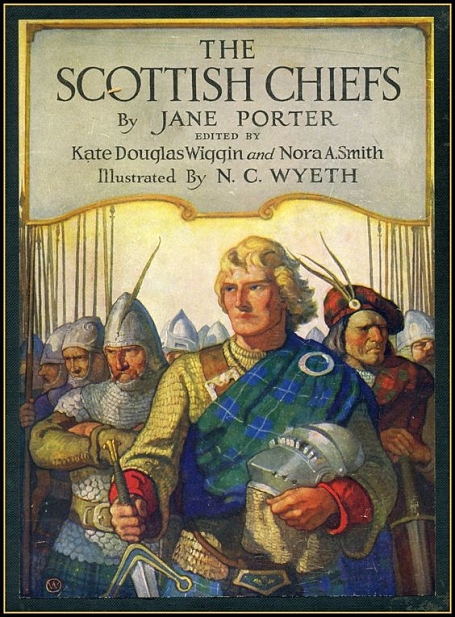The Life and Heroick Actions of the Renoun'd Sir William Wallace,
General and Governour of Scotland
by William Hamilton of Gilbertfield
Book XII, Chapter V (Continued)
The Siege of St. JOHNSTOUN.
Mean Time, Five Hundred South'ron bold and stout,
Early one Morning briskly sally out
At the South Port, against Dundass and Scot,
Where they got a Reception mighty hot.
The English fought it for a While, but then
Retir'd with no less Loss, then Fourscore Men.
Yet tho' they were at that Time soundly beat,
They took the Knight Dundass in the Retreat.
Presented him before the Earl York,
Which put an End unto that Morning's Work.
The Knight Dundass nothing at all did find,
But what was Civil and exceeding kind.
The Earl York, so Mercifull was he,
Most gen'rously dismiss'd and set him free.
For which the grateful Wallace by and by
Return'd him hearty Thanks most Courteously.
Assuring him upon his Honour, that
He would his kindness soon retaliat.
The Earl now of Fife, who had a Truce,
With Edward, but an honest Heart to Bruce,
Perceiving Wallace like a faithfull Liege,
To carry on the War, came to the Siege,
With him John Vallange, who was Sherriff then
Of Fife, and a brave Train of goodly Men.
Into the Ditch Faggots put very fast,
Around the Stakes, Heather and Hay, they cast.
With Trees and Earth, they made a Passage clear,
Then o'er the Walls do march quite void of Fear.
The South'ron they briskly resist again,
While at the Wall a Thousand Men were slain.
Courageously Wallace his Men leads on,
And hew'd down all before him ev'ry Bone.
Of South'ron Foes did dreadful havock make,
But sav'd the Earl for Dundass's Sake.
In Wax a Lyon on his Cloak did set,
As a safe Conduct when with Scots he met.
Gold in Abundance there he told him down,
And safely caus'd convoy him out of Town.
Women and Children freely he let pass,
As still before his gen'rous Custom was.
Then all the Country liv'd in peace and rest,
And with true Scots the Town was repossest.
Thus having vanquish'd his proud South'ron Foes,
With cheerfull Heart straight to the South he goes.
Edward the Bruce, who had in Ireland been
The Year before, is now in Scotland seen.
With Fifty of his Mother's noble Kin,
Attacks Kircudbright, boldly enters in.
And with those Fifty, for he had no more,
Most gallantly he vanquished Nine Score.
To Wigtoun next he and his Men are gone;
The Castle took, for it was left alone.
Where Wallace and his Men did not neglect,
To meet him with all humble due Respect.
Unto Lochmabane then most cheerfully,
Marched that brave, and gallant Company.
Where Wallace, like a true and faithfull Scot,
Resign'd Command to Edward, and why not?
And promis'd that if Robert Bruce the King
Did not come Home in Person for to reign,
He should in that Case certainly and soon,
Have the Imperial, ancient Scottish Crown.
Prince Edward in Lochmabane tarry'd still,
And Wallace went to Cumnock with good will.
Then with his Friends he met at the Black Bog,
And with them drank a blyth and hearty Cog.
Unto King Edward, News came reeking hot,
Of all the Victories that Wallace got,
And how he Scotland did again reduce,
And that he had received Edward Bruce.
The English Commons deeply swore and said,
That Scotland they would never more invade,
For that it was great Madness to go there,
If the Scots Champion Wallace living were.
Then to Monteith, Edward wrote privily,
Told him the Time was now fast passing by.
"Despatch," said he, "the Thing you took in Hand,
For which ye have my Gold, and I your Band."
The false Monteith read o'er the Letter all,
And then in haste his Sister's Son did call,
To whom the Plot he did discover all,
And made him swear he would it not reveal.
"On Wallace wait," said he, "and frankly tell,
You would with him as a Domestick dwell.
Which if he grants, you must be very sure,
To watch him nicely, and the very Hour
When all alone securely taking rest,
Give me a call, and then I'll do my best."
The Villain promis'd that it should be done,
Then gets himself in Wallace Service soon,
But the brave Wallace never had a Thought,
Of what the false Monteith against him wrought.
And he who now had Scotland Thrice set free,
Nothing design'd but lasting Peace to be.
For much fatigu'd with a long tedious War,
He thought it more Eligible by far,
To serve GOD and his King in his old Days,
That he in Heaven might sing eternal Praise.
The ballad, The Life and Heroick Actions of the Renoun'd Sir William Wallace, General and Governour of Scotland, by William Hamilton of Gilbertfield, 1722, is in the public domain.

The Kingdom of England and the Kingdom of Scotland fought dozens of battles with each other. They fought typically over land, particularly Berwick-Upon-Tweed, and the Anglo-Scottish border frequently changed as a result. Read more at Wikipedia.

The First War of Scottish Independence was the initial chapter of engagements in a series of warring periods between English and Scottish forces lasting from the invasion by England in 1296 ... Read more at Wikipedia.

Digitized version of The Scottish Chiefs, by Jane Porter, a novelization published in 1921 by Charles Scribner's Sons, about William Wallace and the First Scottish War of Independence. Read online at archive.org.